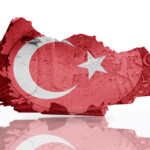A long period of turbulence is probably be unavoidable, and building a constructive relationship will remain challenging.
The EU’s key challenge if Erdoğan remains in power will be to maintain co-operation on issues of mutual interest with Turkey, while also steering Turkey away from policies that undermine the Union’s interests.
The EU would face tough choices in a scenario where there is evidence of widespread electoral manipulation, or if Erdoğan lost the election but did not allow an orderly transition of power. In that case, many member-states would probably favor quickly ending Turkey’s EU accession bid, and some might push for sanctions on key Turkish officials. That would make even sustaining transactional EU-Turkey co-operation difficult, and Ankara would be much more likely to maintain its veto on Sweden’s NATO accession.
Similarly, if Ankara clashed with Greece and Cyprus, there would be calls for the EU to sanction Turkey. While the Union already has a framework for sanctioning Turkey, additional measures require agreement between all the member-states.
But consensus could be elusive, just as it was in 2020. While some member-states would be hawkish, others would not want to sanction a major NATO ally, unless Turkey sparked a military clash. If the US stance towards Turkey became much tougher, the hawks within the EU would be emboldened.
Unless that happened, however, the EU might simply decide to respond to any Turkish actions more subtly by restricting the scope of the customs union arrangement with Turkey through trade measures that do not require consensus between the member-states. These steps could then easily be reversed if Ankara changed its policies.
If tensions around the election and Greece and Cyprus can be avoided, it will be much easier for the EU to work with Erdoğan.
Building a constructive relationship would remain very challenging, and modernizing the customs union would remain impossible, so long as the EU was concerned with the state of democratic freedoms in Turkey and there were bilateral disagreements with member-states.
Still, Turkey would remain an important partner in the energy field as a major source of transit to the EU. Co-operation in areas like migration could conceivably improve, with the resumption of some co-ordination at the border – particularly if the EU took in some of the refugees currently in Turkey and tried to channel more support to helping refugees in the northern part of Syria.
Turkey and Europe might also be able to work together on some foreign policy issues, like stabilizing Libya or restraining Iran’s influence in the Middle East. But any co-operation would be ad-hoc and highly transactional.
Turkey’s EU accession bid would probably hobble on. Despite grumbling from the European Parliament, most member-states would be concerned about the negative consequences of ending the accession process without an alternative ready.
The accession process does not in itself prevent Turkey from pursuing policies that harm the EU’s interests, and ending accession talks would have a limited impact on Erdoğan’s domestic and foreign policy choices.
However, barring a rupture, the EU’s preference will be to keep the membership talks alive. There are fears that ending the accession process would weaken pro-Western sentiment in Turkey, as it would be an unambiguous signal that the EU no longer sees Turkey as a potential member and that it has lost hope for a positive future political trajectory.
Nevertheless, if Erdoğan remains in power, EU leaders would have to seriously consider what a relationship with Turkey not structured around accession could look like.
The alternative to the current model would be a Turkey-EU relationship based on intensive political dialogue, co-operation on issues like migration and energy, and a free trade agreement. Co-operation would continue to be hindered by Turkey’s poor relations with many member-states and by its non-recognition of Cyprus.
Nevertheless, it would be much easier for member-states to agree to a free trade agreement with Turkey than to deepening the customs union, as an FTA requires fewer shared rules than a customs union, and represents a lower level of trade integration.
If the Opposition Wins:
An opposition victory would offer a big opportunity to relaunch the EU-Turkey relationship. But there may be divisions between member-states over how to deal with Ankara. With the EU’s attention focused on helping Ukraine in resisting Russian aggression and on dealing with the economic consequences of the war, relaunching relations with Turkey may not be a major political priority.
However, it would be a mistake for the EU not to help stabilize the new government and seize the momentum of an opposition victory to try to relaunch relations.
The first and easiest step should be intensifying political dialogue at all levels. This will help each side understand the other’s position and build trust to co-operate more. Then, the EU would have to help Turkey deal with its economic turmoil to help stabilize the new government. It will be easier for Europeans to provide Turkey with technical assistance than financial help, given the competing demands for funding, including for Ukraine’s reconstruction.
There is little leeway in the EU budget to give Turkey extra grant funding. However, the EU could agree to help Turkey through a sizable program of macro-financial assistance, which uses the budget as a credit guarantee to give out loans, and for which there may still be some breathing space. The Union can only do this if Ankara agrees on an IMF program first.
Second, the EIB, which has heavily curtailed its lending from 2019 after Turkey’s drilling operations near Greek islands and Cyprus, could also decide to increase its lending for projects in Turkey if the new government signaled a less confrontational attitude towards the EU.
In the medium term, the main aim should be upgrading the EU-Turkey customs union. The member-states will not agree to give the Commission a negotiating mandate unless the new government shows that it is serious about improving democratic freedoms and reduces tensions with Greece and Cyprus, dropping talk of an autonomous state for the Turkish Cypriots.
The conclusion of the negotiations over the upgrade would have to be conditional on Turkey removing obstacles to the free movement of goods with Cyprus and establishing direct transport links with it. Realistically, the EU would also have to make some concessions on some of Ankara’s long-standing complaints about the customs union, for example by offering to involve Turkey more closely in consultations over free trade agreements with third countries.
If the EU and Turkey negotiated an upgraded customs union, that would mean that the Turkish economy was more integrated with the EU’s and that Ankara had progressed in aligning with the requirements of EU membership.
If all member-states agreed, that would eventually allow the resumption of Turkey’s accession negotiations. Turkey might benefit from the rethinking of the accession process sparked by Ukraine’s bid for membership. The EU is shifting towards a ‘phased’ approach to membership which would allow more integration of candidate countries with the Union in different policy areas prior to membership.
That means there could be plenty of scope for Turkey to integrate more closely with the EU, even if it never becomes a member.
If starting or concluding talks on the customs union upgrade proves impossible, there would still be potential for the EU and Turkey to deepen co-operation within the current framework.
Giving Turkish citizens visa-free travel to the EU would help build closer ties, although for member-states to agree Turkey would have to meet all the conditions set by the Union, including co-operating with the judicial authorities of all member-states.
In the migration field, the EU could increase support for refugees in Turkey and Syria, and offer to resettle considerable numbers. In the defense field, Turkey could conceivably join the EU’s Permanent Structured Co-operation project on military mobility, as the US, UK and Canada have done.
The project, which aims at improving physical infrastructure and easing regulatory obstacles to moving troops around Europe, is a key area of EU-NATO co-operation. In foreign policy, there are relatively few limits to how much Europeans and Turkey can co-operate when their interests align. For example, Europeans and Turkey could work together closely in trying to stabilize Syria and Libya, in supporting Ukraine, or in offering Central Asian countries alternatives to building closer ties to Russia and China.
And, even though the Cyprus dispute imposes limits on co-operation between the EU itself and Turkey, individual member-states are free to build closer relations with Turkey, deepening bilateral ties through agreements on issues such as financial co-operation, trade facilitation, energy and infrastructure projects.
Conclusion:
Whatever the outcome of the elections, Turkey and the EU will remain neighbors and have shared challenges to address.
But the results of the elections will define the balance between co-operation and confrontation for years to come.
If Erdoğan remains in power, relations will remain tense and any co-operation is likely to be purely transactional. There would be potential for additional turbulence, particularly over Turkey’s foreign policy.
The EU would have to be ready to respond to any tensions that might flare up, while trying to maintain ad hoc co-operation.
Conversely, an opposition victory would lead to a lowering of EU-Turkey tensions, and pave the way for a revived and strengthened EU-Turkey partnership – although it is unrealistic to think that all sources of friction would disappear.
If the opposition wins the elections, the EU should help stabilize the new government and try to relaunch relations, focusing on upgrading the customs union as a medium-term goal.
This is the third and final part of a report from the Centre for European Reform that FTP is reprinting.
The views and opinions expressed above are the author’s and do not reflect those of the Free Turkish Press.


